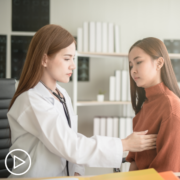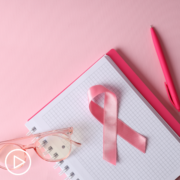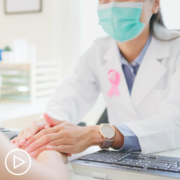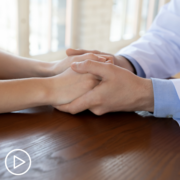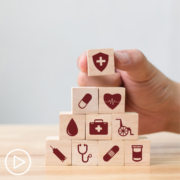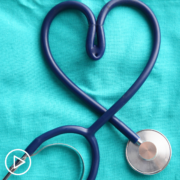What Are Myeloma Risk Factors for Veterans and First Responders?
What Are Myeloma Risk Factors for Veterans and First Responders? from Patient Empowerment Network on Vimeo.
Veterans and first responders may come into contact with myeloma risk factors, but what are they? Expert Dr. Krina Patel from The University of Texas MD Anderson Cancer Center discusses environmental risk factors for 9/11 first responders and veterans, average age of onset for different veteran racial groups, and proactive patient advice.
[ACT]IVATION TIP
“…if you notice that anything is off, you’re not feeling well, or the lab, something is wrong with your labs, make sure to mention that to your physicians, they can first diagnose the correct thing, if something is going on. And two, if you actually have a diagnosis of cancer, I think talking to your teams that there are probably resources out there to help with a couple of things, I think one, even financial resources.”
See More from [ACT]IVATED Multiple Myeloma
Related Resources

Key Advice for Myeloma Patients | Questions to Ask About a Care Plan |
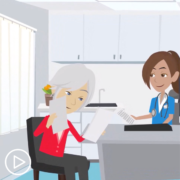
Understanding Myeloma | How You Can Collaborate in Your Care |

Roadblocks for Black and Latinx Patients From CAR T Trial Access |
Transcript:
Lisa Hatfield:
Dr. Patel, a lot of patients wonder what might have caused my myeloma, and there are some environmental factors that are known to have the association with myeloma, like Agent Orange exposure, and now we’re seeing an increased instance of myeloma and other blood cancers in the 9/11 first responders. For patients who might have concerns about this, do you have any suggestions or thoughts on that?
Dr. Krina Patel:
Yeah, I’ve actually quite a few patients that come up to me that were in previous wars or veterans, and the first thing I talk about is the 9/11 first responders. So people ask me if this they’re born with myeloma, that’s the number one question, and I say, you know, likely not, most people do not have genes that they were given by their parents, that causes myeloma.
All of us have different susceptibility to cancer based on how our immune system repairs itself, how our plasma cells repair themselves, the micro-environment, but it’s also our exposures, and we know that there’s certain exposures like Agent Orange, as well as those first responders that went in here in terms of epidemiology, in terms of the number of patients that ended up with myeloma at a younger age, a much younger age. They’re in their 50s, for the most part, that tells us that this was not something that those folks are going to get. This really was based on that exposure, and that’s the hard part of saying that something causes something.
I think we know with 9/11, the numbers were so high that this was a…listen, this is something wrong, that whatever they were exposed to during that process led to their plasma cells becoming myeloma at a much younger age, and it seems that a lot of them had more aggressive disease than the indolent slow-growing myeloma.
We see that a lot of patients get. The other big question I get is, How can we say that something caused this, and then again, it comes back to how many people are exposed and then how many people actually got that disease, and that’s why it becomes so hard. But I know a lot of my patients think about Roundup or different petrochemicals and things like that that they’ve been exposed to, and I know that the government and folks are looking into it because a lot of my patients are getting letters from us and things like that just to say, “Listen, I was exposed to this, could this have caused my myeloma?”
And again, the majority of patients are not exposed to things at that level that really tell us that that’s what caused their myeloma, but I do think that if you are exposed to something like Agent Orange or major petrochemical spill or something that is worthwhile noting at least, even though I most likely won’t be able to tell you it definitely caused the myeloma. We do know that there are environmental exposures that are more likely to lead to cancer, you know, we have these hot spots in the U.S. where especially those petrochemical companies are, where there’s a much higher level of just cancer diagnosis, not just myeloma up to cancer in general, compared to other areas where we don’t have those industrial companies existing.
Lisa Hatfield:
Do you happen to have any tips for patients who maybe were a part of 9/11 event or even veterans or first responders of any type, any tips for them in general?
Dr. Krina Patel:
Yeah, I think that the activations have here is that if you notice that anything is off, you’re not feeling well, or the lab, something is wrong with your labs, make sure to mention that to your physicians, they can first diagnose the correct thing, if something is going on. And two, if you actually have a diagnosis of cancer, I think talking to your teams that there are probably resources out there to help with a couple of things, I think one, even financial resources.
When stuff like this happens, usually there are some financial resources that pop up, and two, the mental aspect of this. You got this while you’re doing something you’re supposed to be doing and helping others, and really finding patient groups which are out there as well, so that you get the resources for just the ability to talk to someone about what happened and being able to go through that process as well.
Lisa Hatfield:
Dr. Patel, are there any notable trends or patterns of the presentation and progression of myeloma and other blood cancers in veterans and first responders that differ from civilians?
Dr. Krina Patel:
Yeah, that’s a great question. I honestly don’t know if there’s been anything published that shows a difference, I tend to see my veterans are a little bit younger in general, average age for myeloma, 70 for Caucasian patients, it’s 65 for Hispanic patients and 66 for African American patients, right? So a lot of my veteran patients have been in their 50s, just a little bit younger than what I’ve seen with most other patients, and then in terms of patterns, not necessarily.
We think, oh, is it more aggressive? Is it not. I do have patients with aggressive disease, but I have patients that come in with MGUS or smoldering disease that eventually turns into myeloma isn’t necessarily high risk or aggressive, but again, I don’t know any data that’s out there that’s published, I think that would be worthwhile. But I will say my patients tend to be on the younger age.

